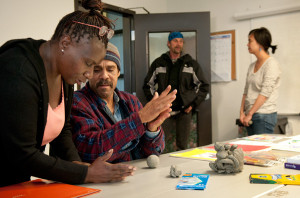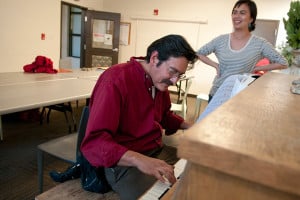Night Outreach, a Stanford community service group committed to establishing relationships with the homeless community of Palo Alto, celebrated the opening of the first women’s-only homeless shelter program in Palo Alto last week. The shelter, a joint effort between Night Outreach and Innvision, the largest housing provider in Santa Clara County, is a new addition to the only homeless shelter program in Palo Alto, Hotel de Zink.

In the new program, the Stanford students in Night Outreach will be “running everything on the ground,” according to Brenda Mutuma ’13, the group’s food and meal coordinator.
Night Outreach members raised approximately $22,000 to fund the project. In addition to receiving grants, they set up an online donation system, collected donations around campus and organized two fundraising drives with The Counter and Panda Express.
Night Outreach members were inspired by the Harvard Square Homeless Shelter, a Harvard University student-run shelter that has been in operation for 28 years, providing protection from the cold winter. Night Outreach decided to partner with Hotel de Zink to launch a similar project in the Palo Alto community.
The 15-bed Hotel de Zink shelter rotates through 12 area churches. Each church houses 12 to 17 people for one month. The women’s shelter will be an extension of the same format. Hotel de Zink has provided the new shelter with case managers, some of its overnight staff and training. Case managers select residents and help them find jobs and services. Night Outreach is responsible for providing the rest of the resources.
In her role as food and meal coordinator, Mutuma has responsibilities such as ensuring that meals reach the shelter on time and finding volunteers to cook meals. As a political science major, she is particularly interested in food policy, hunger politics and food security.
“Food is that one thing that everybody needs to survive, so why should anyone be deprived of that?” Mutuma said. “When you share food with someone, that’s another opportunity for learning about someone, for learning about yourself.”
The women’s shelter program is an expansion of Night Outreach’s efforts to interact with the local homeless community. For the past ten years, members and any other Stanford affiliates have participated in weekly Night Outreach walks. The group goes to downtown Palo Alto to engage with the homeless community, “with the belief that compassion and conversation are just as important as food and shelter,” according to the Night Outreach mission.
The conversations vary in topic and length.

“[We talk about] whatever they want to talk about, whatever we want to talk about,” Mutuma said. “People have an issue about how uncomfortable it might be, but it’s beautiful, a lot of the times. You run into a lot of their own personal stories that are really touching.”
The organization challenges participants to overcome prejudices and stereotypes through joining the Night Outreach walks, Mutuma said.
“When you stay in the Stanford bubble, you don’t get any exposure to what the world is really like, everything that the world has to offer and everything that everybody has to offer no matter their socioeconomic status,” Mutuma added.
On one of the walks, Kurt von Laven ’12, Night Outreach webmaster, met a man sitting in the corner of the train tracks, listening to the radio.
“He said that it made him feel connected to the world,” von Laven said. “That really struck me because it didn’t seem like something that would make me feel that way. It made me wonder how isolating his experiences had been.”
Members of Night Outreach also frequently visit the Opportunity Center, a local service provider for the homeless. At the Center, they lead activities such as art workshops for children and computer training programs.
“The biggest challenge for us, but also the most rewarding, is that it’s hard to know who’s going to be there,” von Laven said. “We try to make it very clear that we’re coming back, and that’s why it’s very important for us when we’re recruiting volunteers to make sure they are able to make that kind of a commitment.”
This commitment to the homeless population of Palo Alto is a central tenet of Night Outreach.
“I’m walking into this very humbled,” Mutuma said of her work with the women’s shelter at Hotel de Zink. “It’s all a learning opportunity and it’s a thank you to the members of the [homeless] community.”